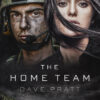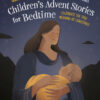Greetings from Sarah Sundin in California! Today I have the joy of interviewing novelist Eleanor Gustafson. She’s built houses, made her own maple syrup, and she plays with “word plants.” I think you’ll enjoy what Ellie has to share!
Ellie, tell us about your book.
An Unpresentable Glory is a many-dimensioned love story. A stranger, more dead than alive, shows up in Linda’s garden. She cares for him and only later learns who he really is. Some fascinating story elements are woven together in this complex tapestry that blazons the glory of God.
What inspired you to write this book?
My husband’s dad was the first death I was “in” on. The night before he died, I volunteered to take the night shift, as a bladder infection made him restless and required constant attention. I sat beside him, serving him as needed—my father-in-law! But through those difficult hours, I felt I was on holy ground, the room peopled with angels.
This awkward stint of servanthood affected me profoundly, eventually moving me to write An Unpresentable Glory. Whatever hidden, “unpresentable” ways He asks us to serve may reflect God’s glory more vividly than our more well-dressed benevolences. Places or situations that are awkward and not for public view may become God’s platform for displaying His love. This love could be for all to see (presentable) or only for the eyes of the participants.
The bottom line: God can cover our messes with His glory—if we submit to and trust Him wholeheartedly.

An Unpresentable Glory by Eleanor Gustafson
What was your greatest challenge in writing this book?
My biggest challenge was getting it right—the plot, the drama, the unpresentable “message,” if you can call it that. Over a number of years, I asked at least half a dozen beta readers to give me an honest assessment. They did their job—exceedingly well—and then I had mine to do, in shaping their comments to my vision. I bless each of them!
My current task is promoting the novel without plot spoilers. A bigger challenge than one might think! Who is the stranger that Linda found sprawled in her garden? You won’t find out till Chapter 7.
What a tease! What themes do you return to again and again in your writing?
In my stories, I tend to focus on the cosmic struggle between good and evil in light of God’s overarching work of redemption. God is sovereign, but He is also love, and relating to Him is far more important than our trying to make a mark in the world. As a writer, I need to communicate this as best I can—through words. Eugene Peterson, in As Kingfishers Catch Fire, has this to say:
Language, one of the defining characteristics of being human, is integral to the way God—the Word made flesh—reveals and works. It follows that the way we use language, not simply that we use it, is significant. The way Paul uses language in his writing is to load it with metaphor. There is hardly a paragraph he writes that lacks a metaphor.
I want to express—through the most powerful words I can muster—the essence of who God is and how we can tie in with Him—right here—as though we were sitting on His lap.
Why do you love writing?
I’m always surprised by what comes out. I’m smart in some ways but terribly stupid in others. I sometimes sit down in my dumbness, start typing, and words poke up like seedlings out of hard ground. These word plants have to be weeded and pruned multiple times, but the final product often amazes me. Did I write that??
I love the phrase “word plants”—so descriptive! Ellie, when did you first recognize God’s call to write for Him?
As a child, I gained a sense of story from nightly reading sessions on my mother’s lap. I got hooked on story and early on, made up bizarre tales in my head. As my faith strengthened, Christian truth slipped in, and my stories became more substantive. When I dared to start writing them down (I’m talking mid-life here), I soon felt that careful plot and character development could turn my stories into vehicles for Truth. Two novels came out of that mental cache!
What talents do you have aside from storytelling?
Over the years, I’ve been a musician—piano/organ, voice, and trombone (briefly). I taught horsemanship in college. I’ve grown some pretty good gardens. I hammered nails on our homemade, two-story garrison house and served as quality control (“No, it’s not plumb; take it out and do it again”). As a tree farmer, I wasn’t terribly good with a chainsaw but could girdle a tree with an axe almost as fast. During sugaring season on our tree farm, I stoked the evaporator and produced good-tasting maple syrup. I love reading out loud and have a good sense of drama.
Most of these skills have disappeared with age, but God has given me a new and enduring skill—that of loving on people. In my earlier years, this was probably my least favorite thing to do, so I know it’s a genuine gift.
- At church, I watch for new people, touch and talk with as many others as I can, and love on the “odd” folk.
- On email, I interact with and encourage a wide variety of people—friends, missionaries, and internationals.
- I have a prayer notebook that I use daily—a substantive way to show love.
You certainly have an interesting life! Tell us about your favorite library memory.
When I was in grammar school—a long time ago—our little town of Branchville (900 pop.) had a library—a small corner just inside the side door of Selected Risks Insurance Co. with a few shelves of books. I haunted the place and probably never had greater pleasure in any other library. The quality of my reading enjoyment was pretty low back then—Bobbsey Twins, Nancy Drew, cowboy stories—but I read voraciously and quickly got glasses to prove it. I had poor English teachers in high school, but one of those lesser lights assigned Silas Marner, and my literary appreciation began to soar.
Early in our marriage, a significant library landed in my lap when we moved into an old parsonage. In the attic, we found several boxes of books that someone had left—just for me, I wondered? Classics of all sorts, many stuffed with appropriate Sunday newspaper clippings. A God gift, for sure! I have read and treasured those books over many years.
From what I can see online, Branchville still has no in-town library. My friendly shelves are long gone, but not my love for books.
Ellie, please tell us about your next project.
My next project is to stop writing novels. In what time remains to me, I hope to have space to smell the roses, read for pleasure, and listen to music that makes me cry. The segue into heaven could be abrupt and definitive, but it could also be reflective of a life full of learning and adventure, of growing into the Real Person that God has been shaping these many years. Please read and enjoy my final novel, and if it changes your life, I’d like to hear about it.
Enjoy your retirement, Ellie!
To learn more about Ellie and her books, please visit Eleanor Gustafson’s website.
Writing for Him,
Sarah Sundin





Clarice G James
July 19, 2018 - 11 : 02 : 36Ellie Gustafson, a smiling example of an obedient servant, is one of my favorite people. The energy, passion, faith, and skill she pours into life is reflected in the characters and stories she creates. As the youngest and most active 80-something-year-old person I know, I am inspired by her long-standing commitment to bring God glory in all she does. See for yourself in her literary novels Dynamo and An Unpresentable Glory.